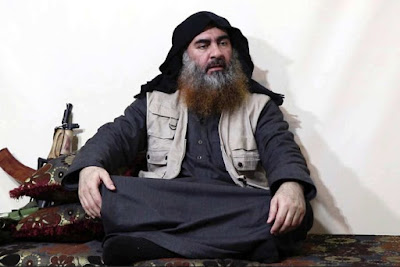BAGHDAD/WASHINGTON (Reuters) - Islamic State leader Abu Bakr al-Baghdadi is believed to have been killed in a U.S. military operation in Syria, sources in Syria, Iraq and Iran said on Sunday, as U.S. President Donald Trump prepared to make a “major statement” at the White House.
A U.S. official, speaking on condition of anonymity, told Reuters that Baghdadi was targeted in the overnight raid but was unable to say whether the operation was successful.
A commander of one of the militant factions in the northwestern Syrian province of Idlib said Baghdadi was believed to have been killed in a raid after midnight on Saturday involving helicopters, warplanes and a ground clash in the village of Brisha near the Turkish border.
Two Iraqi security sources and two Iranian officials said they had received confirmation from inside Syria that Baghdadi had been killed.
“Our sources from inside Syria have confirmed to the Iraqi intelligence team tasked with pursuing Baghdadi that he has been killed alongside his personal bodyguard in Idlib after his hiding place was discovered when he tried to get his family out of Idlib towards the Turkish border,” one of the Iraqi officials said.
U.S. magazine Newsweek, which first reported the news, said it had been told by a U.S. Army official briefed on the raid that Baghdadi was dead. It said the operation was carried out by special operations forces after receiving actionable intelligence.
The Pentagon did not immediately respond to a request for comment.
White House spokesman Hogan Gidley announced late on Saturday that Trump would make a “major statement” at 9 a.m. EST (1300 GMT) on Sunday. Gidley gave no further details.
The president gave an indication that something was afoot earlier on Saturday night when he tweeted without explanation, “Something very big has just happened!”
Trump has faced withering criticism from both Republicans and Democrats alike for his U.S. troop withdrawal from northeastern Syria, which permitted Turkey to attack America’s Kurdish allies.
Many critics of Trump’s Syria pullout have expressed worries that it would lead the Islamic State militancy to regain strength and pose a threat to U.S. interests. An announcement about Baghdadi’s death could help blunt those concerns.
For days, U.S. officials had feared that Islamic State would seek to capitalize on the upheaval in Syria. But they also saw a potential opportunity, in which Islamic State leaders might break from more secretive routines to communicate with operatives, potentially creating a chance for the United States and its allies to detect them.
Baghdadi was long thought to be hiding somewhere along the Iraq-Syria border. He has led the group since 2010, when it was still an underground offshoot of al Qaeda in Iraq.
On Sept. 16, Islamic State’s media network issued a 30-minute audio message purporting to come from Baghdadi, in which he said operations were taking place daily and called on supporters to free women jailed in camps in Iraq and Syria over their alleged links to his group.
In the audio message, Baghdadi also said the United States and its proxies had been defeated in Iraq and Afghanistan, and that the United States had been “dragged” into Mali and Niger.
At the height of its power Islamic State ruled over millions of people in territory running from northern Syria through towns and villages along the Tigris and Euphrates valleys to the outskirts of the Iraqi capital Baghdad.
But the fall in 2017 of Mosul and Raqqa, its strongholds in Iraq and Syria respectively, stripped Baghdadi, an Iraqi, of the trappings of a caliph and turned him into a fugitive thought to be moving along the desert border between Iraq and Syria.
U.S. air strikes killed most of his top lieutenants, and before Islamic State published a video message of Baghdadi in April there had been conflicting reports over whether he was alive.
Despite losing its last significant territory, Islamic State is believed to have sleeper cells around the world, and some fighters operate from the shadows in Syria’s desert and Iraq’s cities.
Source: Reuters, Ahmed Rasheed, Phil Stewart and Steve Holland, October 27, 2019
⚑ | Report an error, an omission, a typo; suggest a story or a new angle to an existing story; submit a piece, a comment; recommend a resource; contact the webmaster, contact us:
deathpenaltynews@gmail.com.
Opposed to Capital Punishment? Help us keep this blog up and running! DONATE!
"One is absolutely sickened, not by the crimes that the wicked have committed,
but by the punishments that the good have inflicted." -- Oscar Wilde












